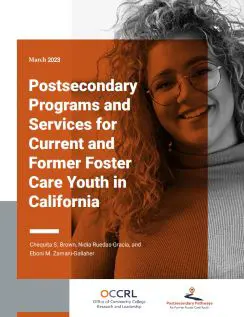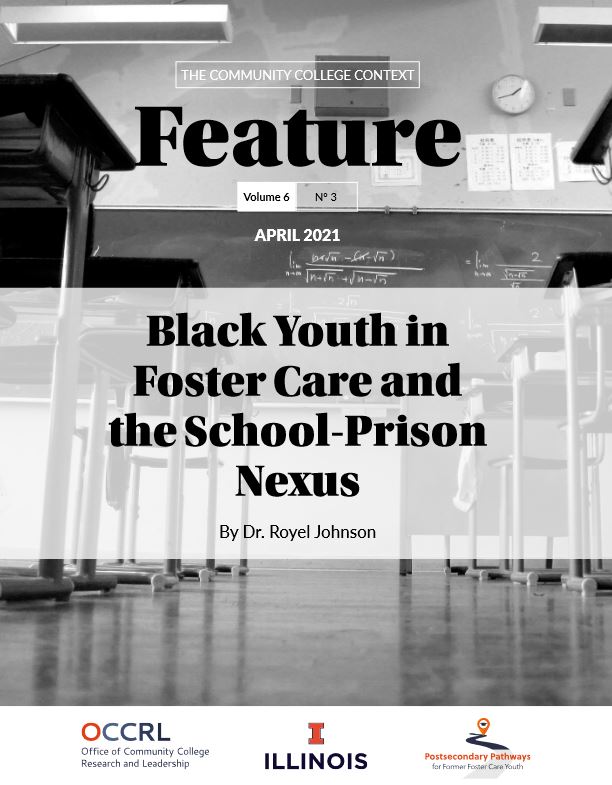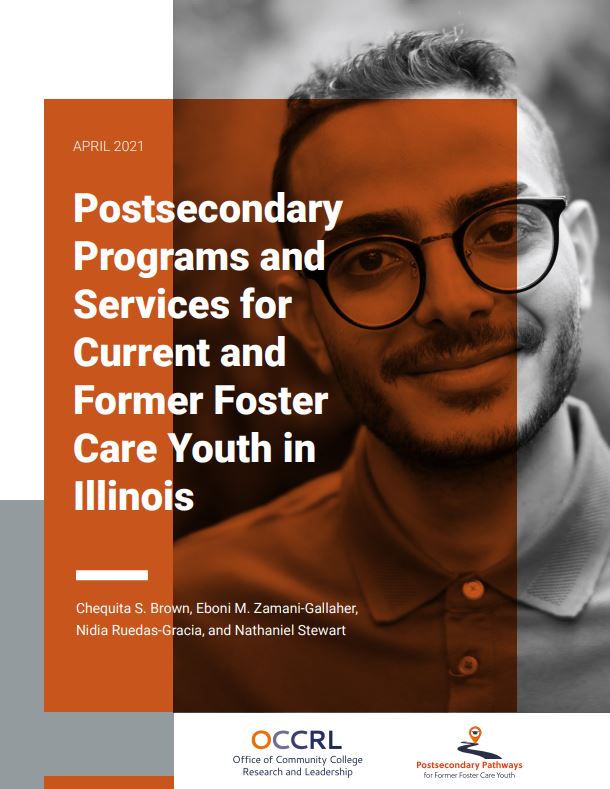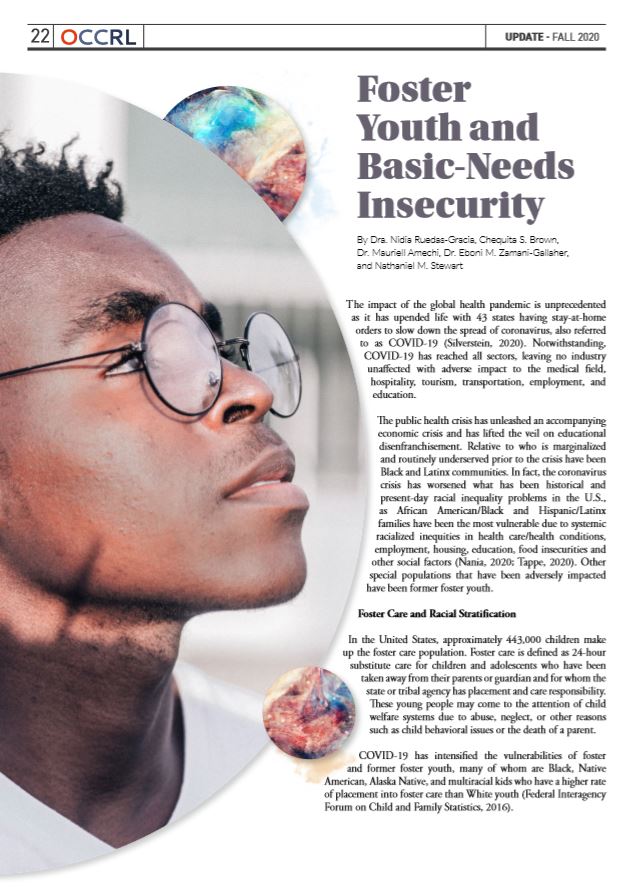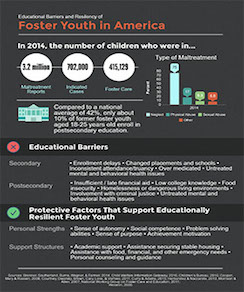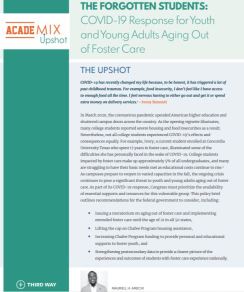
Postsecondary Pathways - for Former Foster Care Youth
This project has been completed and is no longer active.
However, we hope you are able to utilize its resources.
The Postsecondary Pathways for Former Foster Care Youth (PP-FFCY) reflects OCCRL’s commitment to examining and developing postsecondary pathways that support mobility for first-generation, underserved, and minoritized populations, as well as strengthening career pathways to promote seamless transitions from college to careers. This project endeavors to examine postsecondary access, opportunities, and supports for foster youth in Illinois and other states across the county in addressing access and outcomes of FFCY in Career Technical Education (CTE).
Purpose
The Postsecondary Education Pathways for Former Foster Care Youth (PP-FFCY) project is an exploratory study focused on postsecondary pathways for current and former foster youth in Illinois. OCCRL is conducting a comprehensive-needs assessment that provides a descriptive profile of current and former foster youth populations in Illinois; examines postsecondary access, opportunities, and supports for foster youth in Illinois; and addresses disparities in career and technical education (CTE) programs. This project reflects OCCRL’s commitment to examining and developing postsecondary pathways that support mobility for first-generation, underserved, and minoritized populations as well as strengthening and supporting career pathways to promote seamless transitions from college to careers.
Resources
OCCRL aims to increase postsecondary awareness, access, and attainment for current and former foster care youth by providing information on programs and other resources that offer holistic support and services. View the list of postsecondary programs and services.
Strategies to Cultivate a Foster-Friendly Culture on Community College Campuses
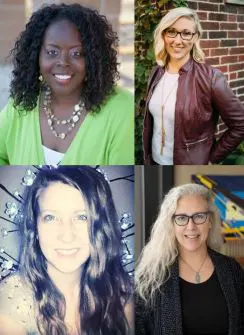 In this episode, Chequita Brown talks with Kate Danielson of the organization Foster Progress, as well as with Anna Wandtke and Tricia Wagner of Rock Valley College in Rockford, Illinois. The group discusses how to cultivate a foster-friendly culture at Illinois community colleges.
In this episode, Chequita Brown talks with Kate Danielson of the organization Foster Progress, as well as with Anna Wandtke and Tricia Wagner of Rock Valley College in Rockford, Illinois. The group discusses how to cultivate a foster-friendly culture at Illinois community colleges.
Navigating College as a Foster Care Alum
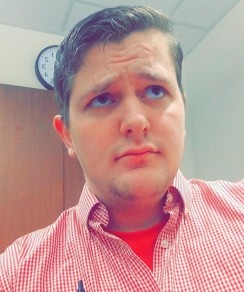 In this episode, OCCRL research assistant Chequita S. Brown talks with Jonathan Stacy, a sophomore at Heartland Community College who is pursuing his studies and a possible career in criminal justice.
In this episode, OCCRL research assistant Chequita S. Brown talks with Jonathan Stacy, a sophomore at Heartland Community College who is pursuing his studies and a possible career in criminal justice.
Listen to the podcast and view the transcript.
Key Elements to Successfully Connecting Foster Care Youth to Educational Resources for Postsecondary Success
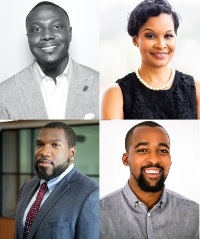 In this episode, Nathaniel Stewart talks with Mauriell Amechi, Regina Gavin Williams, and Blayne Stone Jr. about how the transitions and pathways to postsecondary education are similar and different for Black former foster care students. The scholars also discuss key elements to successfully connect foster care youth to educational resources that help advance the postsecondary education opportunities for this student population.
In this episode, Nathaniel Stewart talks with Mauriell Amechi, Regina Gavin Williams, and Blayne Stone Jr. about how the transitions and pathways to postsecondary education are similar and different for Black former foster care students. The scholars also discuss key elements to successfully connect foster care youth to educational resources that help advance the postsecondary education opportunities for this student population.
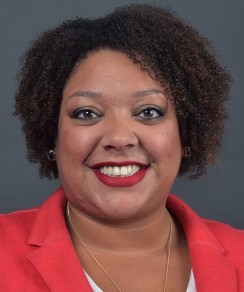
Maddy Day
The Impact of Campus-Based Support Programming on Foster Care Collegians' Postsecondary Access and Retention
In this episode, Chequita Brown of OCCRL talks with Maddy Day about the Fostering Success initiative in Michigan and the impact of campus-based support programming on foster carecollegians' postsecondary access and retention.
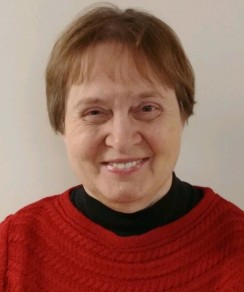
Patricia Palmer
How Youth-in-Care in Illinois Can Access Educational Resources to Pursue a Postsecondary Education
In this episode, OCCRL research assistant Chequita Brown continues the conversation on foster care youth by talking about with Patricia Palmer about accessing available resources in Illinois for youth-in-care who want to pursue a postsecondary education.
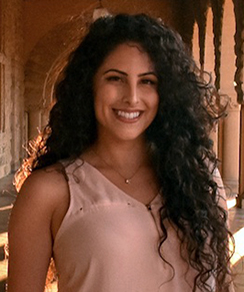
Nidia Ruedas-Gracia
Conceptualizing 'Sense of Belonging' Among Students From Historically Minoritized Racial Groups Within Higher Education
In this episode, Colvin Georges Jr., a research associate at OCCRL, talks with Dr. Nidia Ruedas-Gracia about what it means to have a sense of belonging and discusses her research in this area. They also discuss how a sense of belonging affects college students from historically minoritized racial groups.
Postsecondary Programs and Services for Current and Former Foster Care Youth in California
By Chequita S. Brown, Nidia Ruedas-Gracia, and Eboni M. Zamani-Gallaher
This brief highlights postsecondary programs and services in California that support youth in care, in addition to young adults who are aging out of foster care. Read more.
Tracking College-to-Career Pathways for Foster Youth
By Chequita S. Brown
In this OCCRL Thought Paper, Chequita S. Brown relates how tracking the data of students with foster care experience helps to recognize them as a legitimate student population. She offers recommendations on how to do this and conveys the many obstacles that can hinder the academic and career success of foster youth. Read more.
Black Youth in Foster and the School-Prison Nexus
By Royel Johnson
In this OCCRL Feature Brief, Dr. Royel Johnson argues that the foster care system, and more specifically congregate care facilities, are part and parcel to the enhancement of carceral state power. Read more.
Postsecondary Programs and Services for Current and Former Foster Care Youth in Illinois
By Chequita S. Brown, Eboni Zamani-Gallaher, Nidia Ruedas-Gracia, and Nathaniel M. Stewart
This research brief provides an overview of programs and services that helps strengthen postsecondary pathways for current and former foster youth in Illinois. Read more.
Foster Youth and Basic-Needs Insecurity
By Dra. Nidia Ruedas-Gracia, Chequita S. Brown, Dr. Mauriell Amechi, Dr. Eboni Zamani-Gallaher, and Nathaniel M. Stewart
This article discusses how COVID-19 has intensified the vulnerabilities of foster youth and former foster youth, many of whom are Black, Native American, Alaska Native, and multiracial children who have a higher rate of placement into foster care than White youth (Federal Interagency Forum on Child and Family Statistics, 2016). Read more.
(From the Fall 2020 UPDATE on Research and Leadership)
Exploring Equity in Postsecondary Education
By Heather L. Fox, Eboni M. Zamani-Gallaher
This chapter examines how postsecondary practitioners are encouraged to work collaboratively with child welfare agencies and other community-based organizations to identify and implement culturally responsive supports for former foster youth to promote early academic achievement. Read more.
The Forgotten Students: COVID-19 Response for Youth and Young Adults Aging Out of Foster Care
By Mauriell H. Amechi
This policy brief outlines recommendations for Congress to consider regarding the country's COVID-19 response, in an effort to prioritize the availability of essential supports and resources for youth and young adults who are aging out of foster care. Read more.
Doctoral Student Moms: The Invisible, Nontraditional Students on Campus
The number of female doctorate recipients has increased in the last decade as student demographics have changed. Women, in fact, earned 58% of all doctorates in 2021 in non-science and engineering fields (National Science Foundation, 2023). Despite these gains, there has been an insufficient focus on the experiences of student mothers. This nontraditional student group does not fit the typical college profile and therefore requires greater attention and support to better understand and address the challenges they face as full-time doctoral students at research universities.
The U.S. Department of Education describes nontraditional students as having at least one or more of the following characteristics: delayed enrollment, working while studying, having dependents other than a spouse, and being financially independent (National Center for Education Statistics, 2023).
According to the Association of Nontraditional Students in Higher Education (ANSHE), nontraditional graduate students are defined as adult learners who engage in part-time higher degree programs while working full-time jobs or those who resume their studies after a prolonged break due to life events such as military service or family-related circumstances. Because they strive to balance their family responsibilities with their academic commitments, these types of student populations differ from the target audience of the general university student policies and need more support. That support includes addressing structural inequities (Curtis, 2004), adding counseling assistance on campus (Eisenbach, 2013), and addressing well-being issues that go along with parenting and maintaining full-time status in a graduate program (Ajayi, 2022; Lundquist, Rubel & Ng, 2020; Schriver 2021).
These issues lead to significant challenges for student mothers and, unfortunately, to higher dropout rates. Statistics of all doctoral student attrition are high in North America, indicating that 40% to 50% leave school (Litalien & Guay, 2015). Research indicates that women with children are less likely to finish a doctoral program than their male or childless counterparts (National Science Foundation, 2023), which is why it is crucial to acknowledge and support the unique challenges that doctoral mothers face in achieving their academic and career goals.
As additional academic pursuits demand more outstanding commitments, it can be challenging for mothers to balance their responsibilities, which can include being a full-time graduate student, a graduate assistant, a partner, or a mother, as well as experiencing other familial and community roles that differ for the typical graduate student (Armenti, 2004; Mirick & Wladkowski, 2018; Catalano & Radin, 2021).
A recent study by Bodkin and Fleming (2021) emphasized the need for family-friendly policies for doctoral students to promote gender equality and support female student parents. This is especially important considering the limited income and high child care costs faced by doctoral students in the U.S., as highlighted by Mirick & Wladkowski (2020) and Navarro-Cruz et al. (2023).
Women, particularly doctoral-student mothers, still face academic challenges despite their dominance in higher education. More women earn doctorates in non-science and engineering fields than men, earning 58% of all doctorates in 2021 (National Science Foundation, 2023). A better understanding of their challenges is needed to increase their presence in higher education (England et al., 2007). The following policy-level changes could help address structural inequities (Curtis, 2004):
- An update of student-support policies tailored to the diverse needs of graduate students (Bodkin & Fleming, 2021; Ajayi, 2022; Lundquist, Rubel & Ng, 2020; Schriver 2021)
- A reform of campus resources to target different populations on campus, such as subsidized child care, family housing, and support when it comes to school choice (Mirick & Wladkowski, 2020; Navarro-Cruz et al., 2023)
- Changes to address structural inequities that challenge female students to delay starting a family and have children later in their careers (Curtis, 2004)
- An update of the program curriculum to meet student demographics (Mirick & Wladkowski, 2018; Catalano & Radin, 2021)
Many challenges for women in higher education and academia must be researched. Informed policy-level changes will help give equal access and equity to all education stakeholders and participants.
References
Ajayi, K. V., Odonkor, G., Panjwani, S., Aremu, O., Garney, W., & McKyer, L. E. (2022). Socio-ecological barriers to student-parents academic success: A systematic review. Journal of Further and Higher Education, 46(9), 1257-1274.
Armenti*, C. (2004). Women faculty seeking tenure and parenthood: Lessons from previous generations. Cambridge Journal of Education, 34(1), 65-83.
Bodkin, C. P., & Fleming, C. J. (2021). Supporting women scholars’ paths to academia: Examining family-friendly policies of public affairs doctoral programs. Journal of Public Affairs Education, 27(3), 301–325. https://doi.org/10.1080/15236803.2019.1694385
Catalano, A. J., & Radin, S. T. (2021). Parents Pursuing a Doctorate of Education: A Mixed Methods Examination of How Parents Manage the Roles of Student and Parent. International Journal of Doctoral Studies, 16, 253–272. https://doi.org/10.28945/4741
Curtis, J. W. (2004). Balancing work and family for faculty: Why it’s important. Academe, 90 (6), 21–23.
Eisenbach, B. (2015). Finding a Balance: A Narrative Inquiry into Motherhood and the Doctoral Process. The Qualitative Report. https://doi.org/10.46743/2160-3715/2013.1528
England, P., Allison, P., Li, S., Mark, N., Thompson, J., Budig, M. J., & Sun, H. (2007). Why Are Some Academic Fields Tipping Toward Females? The Sex Composition of U.S. Fields of Doctoral Degree Receipt, 1971–2002. Sociology of Education, 80(1), 23–42. https://doi.org/10.1177/003804070708000102
Litalien, D., & Guay, F. (2015). Dropout intentions in Ph.D. studies: A comprehensive model based on interpersonal relationships and motivational resources. Contemporary Educational Psychology, 41, 218-231.
Lundquist, B., Rubel, D., & Ng, K. (2020). Experiences of Counselor Education Doctoral Student Mothers With Young Children. Counselor Education and Supervision, 59(4), 267–282. https://doi.org/10.1002/ceas.12188
Mirick, R. G., & Wladkowski, S. P. (2018). Pregnancy, Motherhood, and Academic Career Goals: Doctoral Students’ Perspectives. Affilia, 33(2), 253–269. https://doi.org/10.1177/0886109917753835
Mirick, R. G., & Wladkowski, S. P. (2020). Women’s Experiences with Parenting During Doctoral Education: Impact on Career Trajectory. International Journal of Doctoral Studies, 15, 089–110. https://doi.org/10.28945/4484
National Center for Education Statistics, 2023. Retrieved from https://nces.ed.gov/pubs/web/97578g.asp
National Science Foundation, 2023. Retrieved from https://www.nsf.gov
Navarro-Cruz, G. E., Dávila, B. A., Amaya, A., & Orozco-Barajas, I. (2023). Accommodating life’s demands: Childcare choices for student parents in higher education. Early Childhood Research Quarterly, 62, 217–228. https://doi.org/10.1016/j.ecresq.2022.08.009
